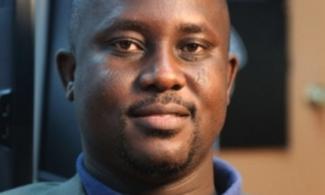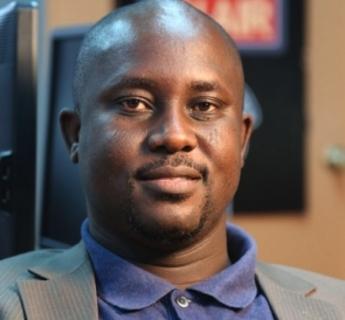
Transport Minister, Rotimi Amaechi, and Kano State Governor, Abdullahi Ganduje, are the two latest manifestations – in a field of daily manifestations – of blind clowns watching a movie on behalf of 180 million sighted people.
Apala crooner, Haruna Ishola (not to be confused with his son), assures us in one of his evergreen oldies that a blind man who ventures into a cinema hall for the latest movie release is to be seen as a confused idler in search of noise. There are less than a million people in charge of this thing we call government in Nigeria. Less than a million people running the lives of 180 million people.
It is depressing that what we have is less than a million blind people in a movie theatre on behalf of 180 million sighted but powerless people. The sighted watch the blind watch the movie on their behalf. Summary of the tragic Nigerian condition.
Transport Minister, Rotimi Amaechi, and Kano State Governor, Abdullahi Ganduje, are the two latest manifestations – in a field of daily manifestations – of blind clowns watching a movie on behalf of 180 million sighted people. Both government officials recently met in Kano. Basically, the blind and the deaf met in Kano to compare notes on transactions with China. And to announce their brand new railway loan deals with China.
The blind man in charge of transportation for the Federal Government announced that the government he represents is currently negotiating a loan of $1.2 billion with China Exim Bank for a new Kano-Kaduna rail line. His host, the blind man in charge of Kano state, “retaliated” by announcing that he is equally negotiating a loan with the same China EXIM bank for about 85% of the $1.85 billion he needs for the Kano intra-city commuter rail project.
First things first. We must thank God that these two representatives of a state government and the federal government even compared notes and exchanged views that they are both currently a-borrowing in China for different rail projects in Nigeria. Given the way these guys run Nigeria, it is absolutely plausible for Amaechi and Ganduje to have bumped into each other accidentally in Beijing in the waiting room of the Ogas at the top of China Exim Bank.
“Eh, Alhaji, you are in China? What are you doing here?”
“Ah, Chief Rotimi, you are here too? I’m here to borrow money for my rail froject in Kano.”
“Ah, Alhaji, what a surprise. I am also here to borrow money on behalf of Baba for our own rail project”.
"Ah, Chief Rotimi, so we are both here for loans. Allah is great. How is Baba?"
"They say he is in London, Alhaji. You know we have no access to him. Maybe you can help us find out from Abba Kyari?"
But I digress. Were these two gentlemen representing a Nigerian establishment with a proven track record of timely and qualitative infrastructural returns and dividends on foreign loans, the current treatise would not be necessary. There is no denying the fact that Nigeria’s infrastructure is unworthy of the 17th century and the 21st century global environment requires the mobilization of domestic and foreign resources to deliver innovative, sustainable, and futuristic infrastructure.
However, modern-day negotiations and transactions such as we are talking about here require a thorough knowledge of one’s history, of one’s track record, a constant evaluation of one’s benchmarks and deliverables, a regular audit of past transactions to build a knowledge archive that could inform and guide today’s transactions.
In essence, where is Nigeria’s China transactions archive? What exactly do Rotimi Amaechi and Abdullahi Ganduje know about Nigeria’s tragic history with Chinese loans? When, how, and where did they do their research? Which aides prepared the informing contexts, trajectories, and evaluations of past loans for them?
When you see photos circulating on social media of Nigerian officials looking lost or pathetically overwhelmed while sitting opposite European, American, or Chinese officials in the context of complex bilateral negotiations and transactions, it is because Nigerian officials largely go to these international theatres as “afoju to re cinema”, blind bats in the cinema hall, ill-prepared, unaware of Nigeria’s trajectory and history in the exact issue they are negotiating about.
In academia and public intellection combined, I think Solana Olumhense holds the distinction of having complied the most extensive archive of Nigerian loans with China. Ever since the inception of formal relations between Nigeria and China in the early 1970s, we have built a monumental pyre of loans that have never really delivered, using every financial and loan formula known to the world of international finance capital.
There is no formula we have not used – including the extremely messy oil for infrastructure deals arranged by Ogbeni Olusegun Obasanjo – mercifully reviewed and reversed by his successor, Umar Yar’Adua. I do not need to go into the reasons why we have sold the future of the next five generations of Nigerians to Chinese loans with practically zilch returns. You know why already. The Nigerian factor – exacerbated by the Chinese factor.
Where a loan is predicated on Nigeria meeting certain conditions, you can be sure that Nigeria would conclude the loan agreement and do everything to default on our own part of the agreement. The Chinese make a killing, using the Yoruba formula of cutting “ese were” (slicing off the feet of a mad man because there are no consequences).
In my study of the depressing archive of Nigeria’s loans from China, I have found it even more depressing that only two administrations have embarked on a semblance of due diligence, audit, and evaluation before embarking on new negotiations for loans: the Abacha regime and the Yar’Adua administration. When Sanni Abacha is the most intelligent and circumspect negotiator of loans and deals with China in your recent history, you know you are in trouble.
Before the Kano announcements by Amaechi and Ganduje, what I would have expected from the Nigerian state is a thorough and complete audit of our loan history with China. You don’t just go about piling up these loans from administration to administration.
And if you think that Nigeria does not pay a heavy price for the ignorance of her afoju to re cinema officials, hear Ganduje, talking to Amaechi in Kano:
“The rail project would save our roads and improve movement of goods and services in Kano, which is the commercial nerve center of Northern Nigeria, and parts of West Africa”
The movement of goods and services? This man is negotiating a Chinese loan for an intra-city light rail project in Kano and is talking about the movement of goods and services?
I hope our friend isn’t going to be repaying China the value of a heavy rail or freight rail system after they construct a light rail system for him in Kano o.
Ogbeni Ganduje, an intra-city light rail is for passengers. It will improve the life span of your roads in kano because less people will drive. However, you cannot use it to haul crude oil, cement, cows, palm oil, rice, and timber from one part of Nigeria to another.
Afoju to re cinema…
